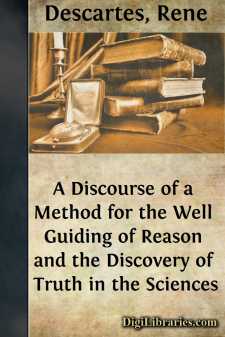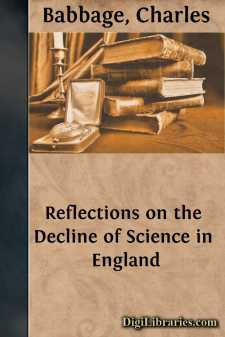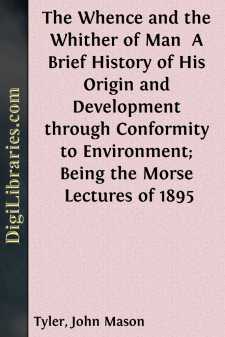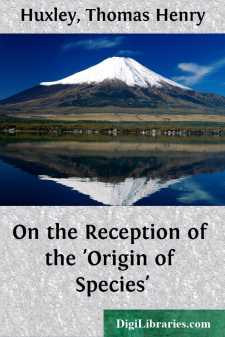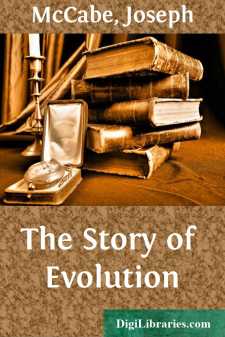Science
- Astronomy 18
- Biology 40
- Chemistry 13
- Electricity 1
- General 38
- History 6
- Light 1
- Paleontology 2
- Philosophy & Social Aspects 1
- Physics 3
- Relativity 2
- Study & Teaching 1
- Waves & Wave Mechanics 1
Science Books
Sort by:
by:
Rene Descartes
PART. I. Right understanding is the most equally divided thing in the World; for every one beleevs himself so well stor’d with it, that even those who in all other things are the hardest to be pleas’d, seldom desire more of it then they have; wherein it is not likely that all Men are deceived: But it rather witnesseth, That the faculty of right-judging and distinguishing truth from falshood (which...
more...
by:
Charles Babbage
CHAPTER I. ON THE RECIPROCAL INFLUENCE OF SCIENCE AND EDUCATION. That the state of knowledge in any country will exert a directive influence on the general system of instruction adopted in it, is a principle too obvious to require investigation. And it is equally certain that the tastes and pursuits of our manhood will bear on them the traces of the earlier impressions of our education. It is therefore...
more...
by:
John Mason Tyler
CHAPTER I THE PROBLEM: THE MODE OF ITS SOLUTION The story of a human life can be told in very few words. A youth of golden dreams and visions; a few years of struggle or of neglected opportunities; then retrospect and the end."We come like water, and like wind we go." But how few of the visions are realized. Faust sums up the whole of life in the twice-repeated word versagen, renounce, and...
more...
THE DARWINIAN HYPOTHESIS [1859] The hypothesis of which the present work of Mr. Darwin is but the preliminary outline, may be stated in his own language as follows:— "Species originated by means of natural selection, or through the preservation of the favoured races in the struggle for life." To render this thesis intelligible, it is necessary to interpret its terms. In the first place, what...
more...
ON THE RECEPTION OF THE 'ORIGIN OF SPECIES.' To the present generation, that is to say, the people a few years on the hither and thither side of thirty, the name of Charles Darwin stands alongside of those of Isaac Newton and Michael Faraday; and, like them, calls up the grand ideal of a searcher after truth and interpreter of Nature. They think of him who bore it as a rare combination of...
more...
WHY WRITTEN Fairies, fays, genii, sprites, etc., were once supposed to be helpful to some favored men. The stories about these imaginary beings have always had a fascinating interest. The most famous of these stories were told at Bagdad in the eleventh century, and were called The Arabian Nights' Entertainment. Then men were said to use all sorts of obedient powers, sorceries, tricks, and genii to...
more...
ON THE ADVISABLENESS OF IMPROVING NATURAL KNOWLEDGE. This time two hundred years ago—in the beginning of January, 1666—those of our forefathers who inhabited this great and ancient city, took breath between the shocks of two fearful calamities, one not quite past, although its fury had abated; the other to come. Within a few yards of the very spot on which we are assembled, so the tradition runs,...
more...
by:
Joseph McCabe
CHAPTER I. THE DISCOVERY OF THE UNIVERSE The beginning of the victorious career of modern science was very largely due to the making of two stimulating discoveries at the close of the Middle Ages. One was the discovery of the earth: the other the discovery of the universe. Men were confined, like molluscs in their shells, by a belief that they occupied the centre of a comparatively small...
more...
by:
Charles Fort
A procession of the damned. By the damned, I mean the excluded. We shall have a procession of data that Science has excluded. Battalions of the accursed, captained by pallid data that I have exhumed, will march. You'll read them—or they'll march. Some of them livid and some of them fiery and some of them rotten. Some of them are corpses, skeletons, mummies, twitching, tottering, animated by...
more...
by:
William Bateson
In seeking to discover Darwin's relation to his predecessors it is useful to distinguish the various services which he rendered to the theory of organic evolution. (I) As everyone knows, the general idea of the Doctrine of Descent is that the plants and animals of the present day are the lineal descendants of ancestors on the whole somewhat simpler, that these again are descended from yet simpler...
more...


